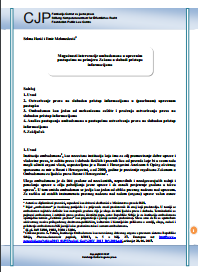Mogućnosti intervencije ombudsmana u upravnim postupcima na primjeru Zakona o slobodi pristupa informacijama
Possibilities of Ombudsman intervention in administrative procedures in the example of the Freedom of Access to Information Act
Author(s): Emir Mehmedović, Selma Horić
Subject(s): Law, Constitution, Jurisprudence, Constitutional Law, Human Rights and Humanitarian Law, Public Law, Evaluation research
Published by: Fondacija Centar za javno pravo
Keywords: Public law; BiH; constitution; ombudsman; administrative proceedings; intervention; information access;
Summary/Abstract: In this paper authors are considering the potential of the Ombudsman's intervention in the Administrative Procedure, which is the basic procedure related to the work of Public administration. Existing legislation provides significant opportunities for Ombudsman to intervene in Administrative Procedure, as well as in Administrative Dispute, as a continuation of the Administrative Procedure. Analysis has been carried out in the area of Freedom of access to information, while the Freedom of Access to Information Act specifically emphasizes the role of the Ombudsman and due to the fact that this freedom is realized in Special Administrative Procedure. The Annual Report on results of the activities of the Institution of Human Rights Ombudsman of Bosnia and Herzegovina for 2016 was taken as the basis for the analysis. Data from aforementioned report compared to the legally regulated potentials led to the conclusion that the Ombudsman does not have significant influence on Administrative Procedures. The Ombudsmen does not use all the available remedies in the area of Freedom of access to information and in this cases it almost never acts as a party in the first instance and second instance of Administrative Procedure nor as the Plaintiff in an Administrative Dispute. Also, the Ombudsman's recommendations are rarely addressed to the second instance bodies or to the Court before termination of the (second instance or judicial) procedure. Timely issued recommendations (although by legal nature not binding) could be helpful in making legitimate and fair decisions by the power of their arguments. Also, it was found that there is not a satisfactory level of cooperation between Ombudsmen and Public Bodies, which challenges the effectiveness and efficiency of the Ombudsman in the area of Freedom of access to information. This requires appropriate measures which can lead to effective protection of the mentioned right. Improvement of the legal framework, cooperation and mutual respect are key factors.
Series: Fondacija Centar za javno pravo - Projekti
- Page Count: 16
- Publication Year: 2017
- Language: Bosnian
- Content File-PDF
- Introduction

